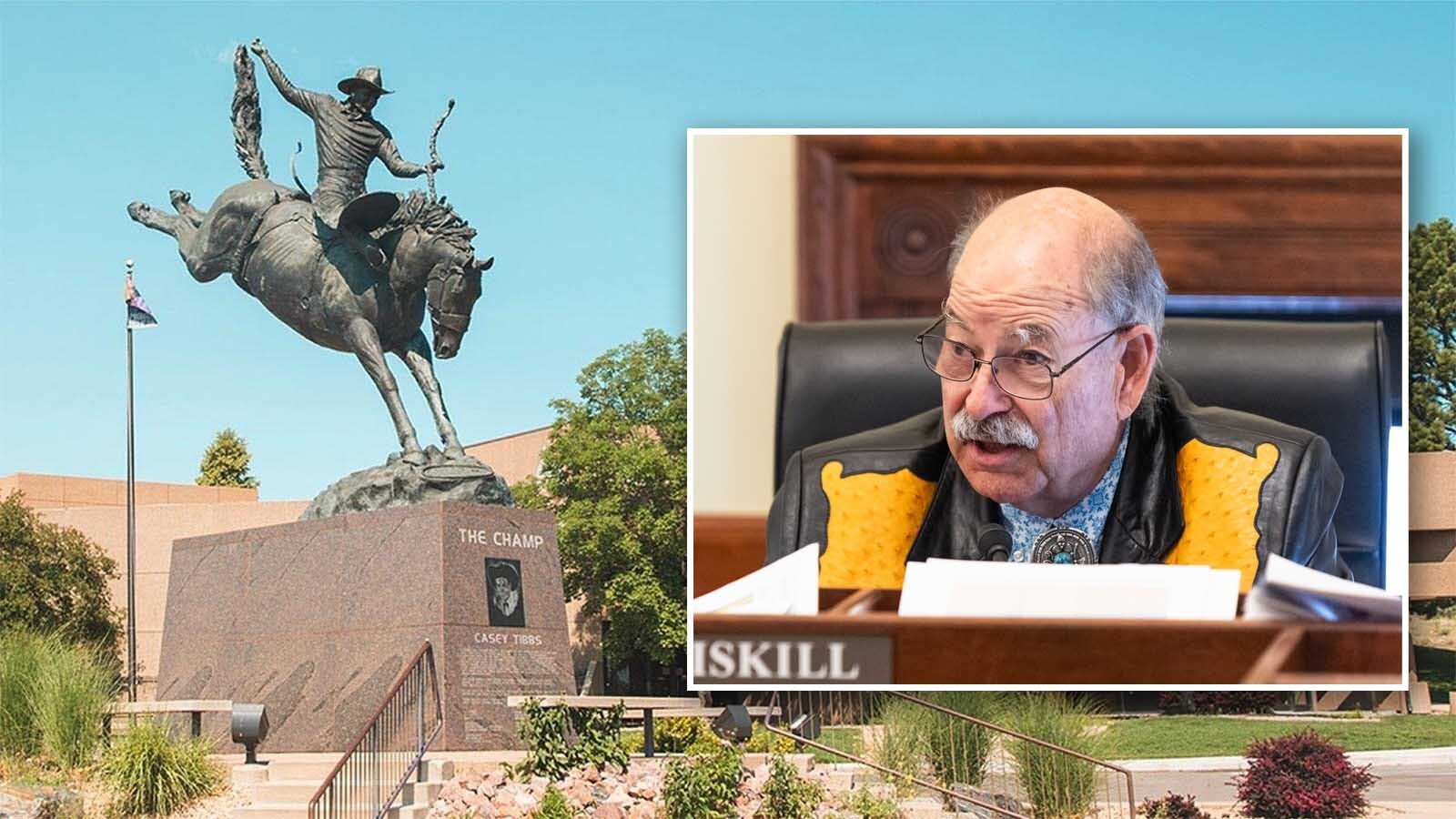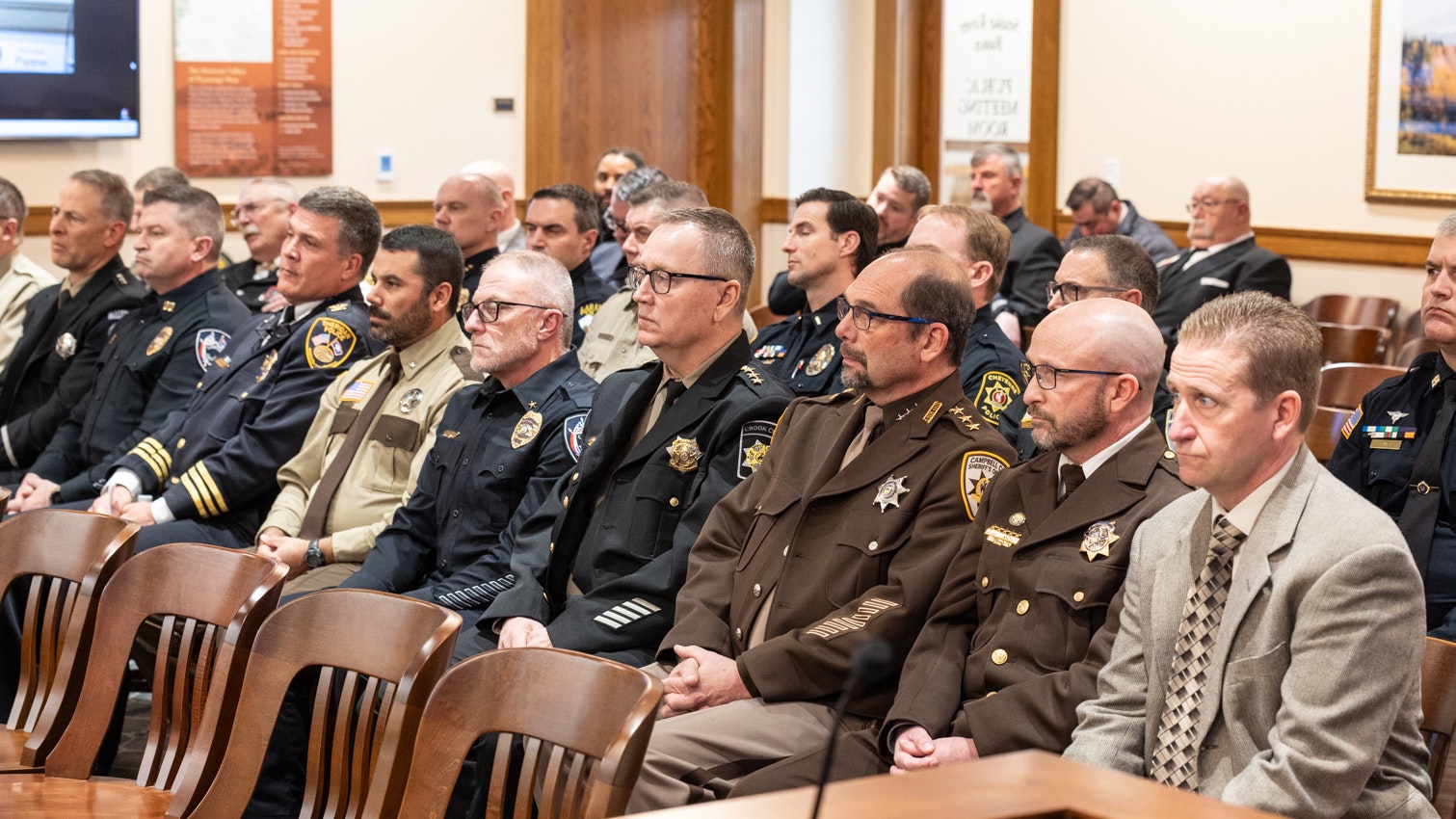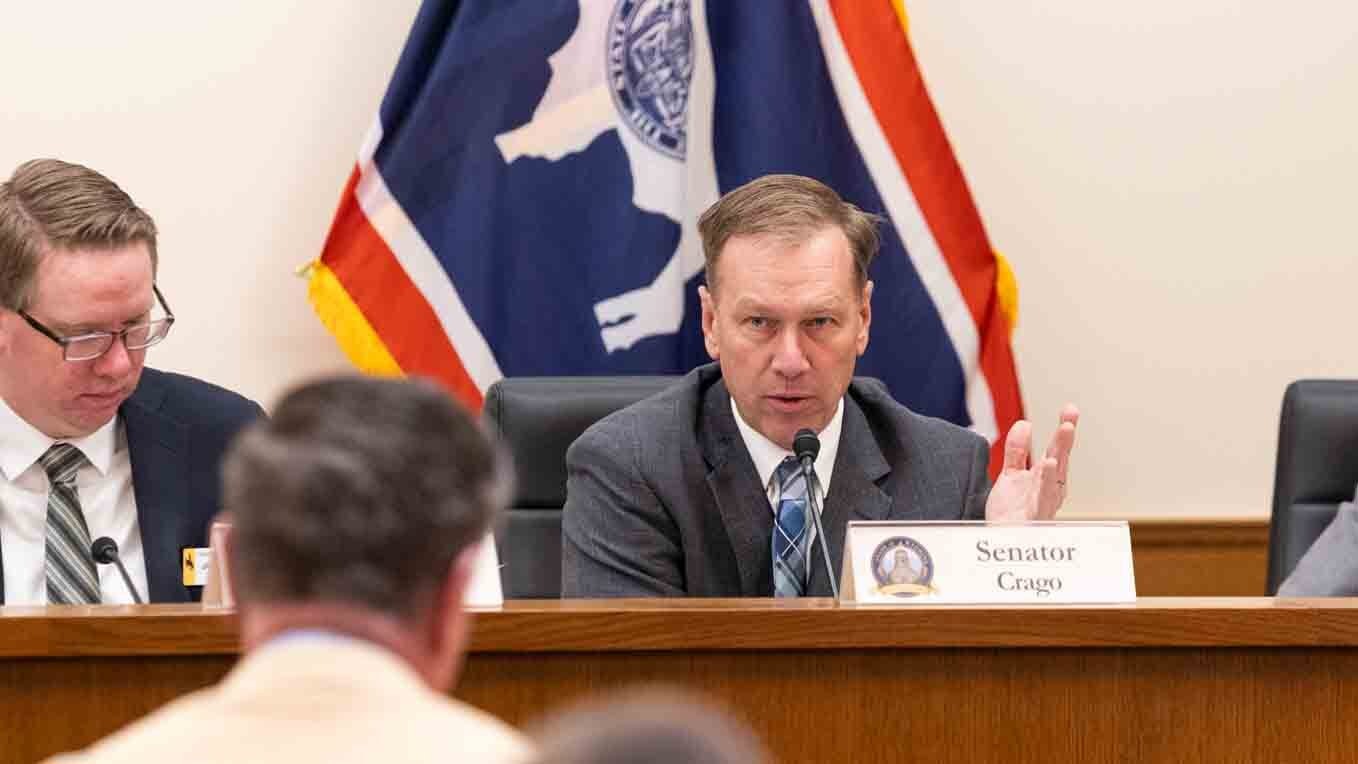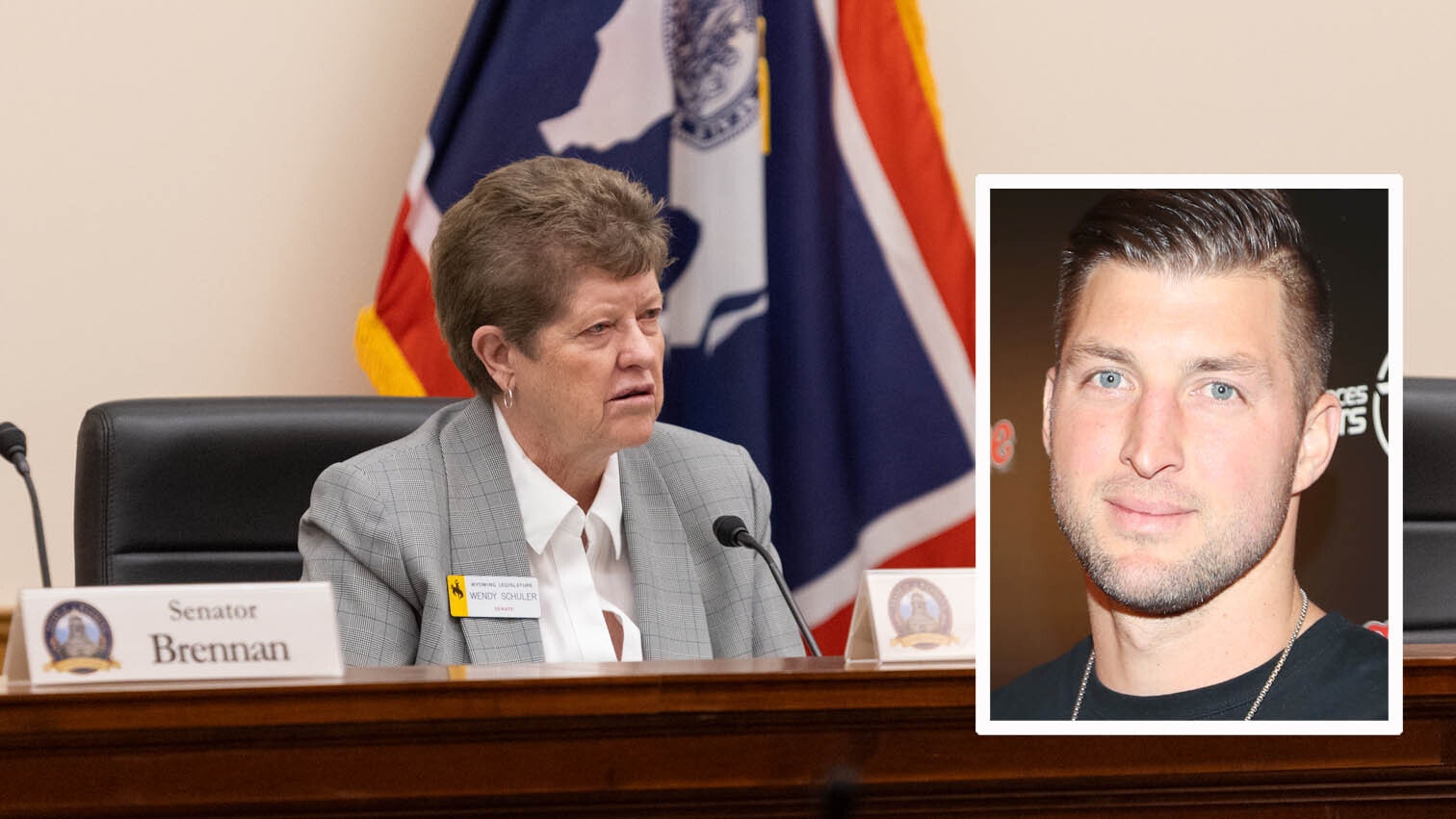While the divisions of the Wyoming House of Representatives were the main attraction of the 2023 legislative session, infighting and division during this year’s session has been much more visible in the Senate.
Senate President Ogden Driskill’s leadership has been challenged since Day One of the session, and he was challenged two times in as many days earlier this week, with multiple close votes held seeking to overturn his rulings.
“We aren’t voting on issues or priorities anymore,” Driskill said. “Just like (Washington) D.C., you’ve got a party line vote.”
On Monday, the Senate voted 15-15 against overruling Driskill’s selections for a new Joint Conference Committee to negotiate the biennial budget. The next day, the Senate voted 16-15 to overturn a ruling Driskill made that the Senate would have to suspend its rules based on a two-thirds vote to resurrect a bill that a committee had defeated hours before.
Majority Floor Leader Sen. Larry Hicks, R-Baggs, believes there’s a problem with leadership in the Wyoming Senate and that Driskill has lost the room.
But as the split votes indicate, that sentiment isn't shared by a majority of the Senate, with Sen. Eric Barlow, R-Gillette, saying he fully supports Driskill.
This past week, Driskill has been more open with his opinion that the Senate has become a “divisive, mean” body.
“That’s a reflection upon the president,” Hicks said. “Where are you going to point the finger? There’s plenty of blame to go around, but when you’re elected to be a leader and you make decisions, there’s consequences to those decisions.”
Hicks and other Republicans have teamed up with the ultra-conservative faction of the Senate to form a voting bloc that has consistently opposed Driskill and the other members of the chamber during the session.
The only factor that has prevented this upstart group from exerting total dominance in the Senate is the swing votes of the two Democratic members who more often side with Driskill.

Where’d It Come From?
Sen. John Kolb, R-Rock Springs, said what’s happened in the Senate hasn’t been the result of members drifting to the right as a whole, but rather a far-right contingency forming a coalition with other Republicans.
“They came over to the middle to where we’re at,” he said. “That’s fundamentally what changed.”
Driskill, Kolb said, has taken the opposite approach, selecting an Appropriations Committee he and many others believe doesn’t effectively represent the chamber.
“He’s lost the middle of the body because it’s more conservative,” Kolb said of Driskill. “If anyone’s caused this split, it was in fact the president. There wasn’t anybody else, pushing everybody to one side was in fact the president.”
Barlow entered the Legislature in 2013 and said the overall state of civility between legislators has worsened since that time.
“I continue to support the president of the Senate because I believe in that institutional integrity,” said Barlow, who before being elected to the state Senate was Speaker of the House.
It’s Been Building
In many ways, what happened Monday and Tuesday was a microcosm of the ongoing infighting that has been escalating in the Senate since the first day of the session.
That day, the Senate overruled a decision Driskill made last spring to remove Sen. Dave Kinskey, R-Sheridan, as chair of the Senate Appropriations Committee.
Driskill called the move to overturn the decision a commentary on his leadership.
“He made a series of decisions that I think exacerbated what I would call minor riffs within the Senate,” Hicks said.
But something both Driskill and Hicks agree on is that the Legislature has become too focused on personalities and outside political influences rather than the issues at hand. Driskill said he’s glad the session is almost over, as he believes the Legislature has regressed in its politics, a movement he describes as “painful” to watch.
“You’ve got a group that looks out and their people literally change their votes to vote the party line rather than an individual vote or policy,” Driskill said. “It’s heartbreaking to see Wyoming come to that.”

Should They Have Been Given More Time?
Driskill celebrated the completion of a budget compromise Tuesday night that he believed validated the previous moves he had made during the budget process.
“You got somebody that actually knows how to negotiate a budget — it’s our goal,” Driskill said. “This has been the process that’s gone on around here.”
Kinskey and others argued that the original committee he chaired to negotiate the budget had been effectively working through the budget process and should have been allowed to continue its work.
Hicks agrees and said the approach Driskill took to appoint a new committee made the budget process more difficult.
“It made it start to galvanize fractures when we were starting to heal a little bit,” Hicks said.
Three of the five members of the first Senate JCC had no past experience on the Appropriations Committee or negotiating budgets, which Hicks saw as proof that the committee was designed to fail. It took this committee four days to produce a counter proposal to the House’s original budget compromise.
“I think they were at the point where they finally felt confident enough they could go in there and represent the Senate and actually do a serious budget negotiations,” Hicks said. “You couldn’t have expected that on the next day with that committee.”
But the five members of the House Joint Conference Committee (JCC) disagreed, seeing the budget in a position of deadlock after the Senate JCC delivered its counter proposal.
“They rejected everything the House proposed and cut out $340 million of House ideas,” Rep. Tom Walters, R-Casper, a member of the House JCC, said immediately after walking out on the counter proposal.
Historical Precedent
The last time a second JCC was called for the biennial budget negotiations was during the 2000 legislative session. Don Richards, budget and fiscal administrator for the Legislature, said this session resulted in the calling of a third JCC to finally hammer out the budget.
Sen. Charles Scott, R-Casper, entered the legislature in 1979, one year after a particularly chaotic budget session that resulted in the calling of a special session to finish out the budget.
Scott said the central dispute of the 1978 session was a debate over whether to fund a medical school at the University of Wyoming.
Through the building of a compromise to fund a family practice medicine program instead, Scott said the issue was finally resolved, which later paid off with the creation of the WWAMI Medical Education Program in the mid-1990s, which allows University of Wyoming students to receive medical degrees from the University of Washington.
“The University of Washington has the best program in the country for certain primary care areas,” he said. “That’s a quality Wyoming would never be able to offer.”
Scott voted against Driskill on every measure Monday and Tuesday. He said Monday night’s debate was unique in that it was the Senate president squaring up against the majority floor leader.
There was also significant contention about the 2018 budget until former Gov. Matt Mead stepped in and helped even things out.

Opportunities For Bridges?
Scott believes one of the biggest issues separating the two factions of the Senate is public school capital construction, and specifically the building of a new Rock Springs High School, which the JCC approved $150 million for Tuesday night.
Most of those who opposed this project have questioned the state methodology used to determine construction deservedness, which Scott believes has divulged into a “corruption of the system.”
Kolb disagrees and believes the building of the new school in his district is deserved and that politics has fueled opposition to it.
“When it comes to a budget that’s worth $10 billion, there’s a lot of moving parts on the game board and sometimes things aren’t what they seem,” he said. “People do it for strategy, positioning.”
If Driskill were to compromise on this issue, Scott believes he could win back the room.
Sen. Cale Case, R-Lander, believes there has been a declining respect for the traditional practices and respect for leadership within the Senate, which he has served in since 1999.
“I don’t think people put the institution first,” he said.
Case said he’s never seen a presiding officer be challenged the way Driskill has been this session and worries this could set off a slippery slope of future challenges to leadership.
But he also mentioned one instance where Drsikill strongly challenged former Senate President Phil Nicholas over one of his bills that Nicholas had been holding in his drawer. When Driskill exerted some pressure, Nicholas moved the bill to the Journal Committee, a mostly symbolic record-keeping panel.
“Ogden was mad about the games, so he challenged it,” Case said.
Driskill declined to comment on the similarity of this situation.
Barlow said he sees the infighting that has ramped up over the last few days as a result of the legislative process working itself out.
“If you believe in the institution and the process that guides that institution, that’s what we witnessed,” Barlow said about the debate over Driskill’s JCC selections. “Was there color? Was there personalities and all that? Sure, but that’s why an institution should be guided by process.”
Setting Sun
With the 2024 legislative session nearing its end, so is Driskill’s role as president. He’ll continue on as president until the party caucasus following the election late next fall, but once the session is over, his day-to-day managerial duties become mostly symbolic.
A former House speaker himself, Barlow said by the time a second legislative session completes, in most situations legislators have already started thinking about who their new leader will be for the next two-year term rather than the current one.
Hicks is next in line to be the next Senate president based on his seniority ranking as majority floor leader, but it will be up to the Republican caucus to decide if it wants to continue with that traditional practice. In recent years, the House has shown an openness to moving away from choosing leadership based on seniority or time spent in the Legislature.
Another factor in those leadership elections will be the results of the Legislature elections that take place later this year, with 15 seats up in the Senate and 62 in the House.
“If the community and the state and folks and members aren’t happy with what we saw, what we’ve been dealing with, they’re going to have to rethink about how they approach it,” Barlow said.
No matter what happens, Case said the Senate members of the 67th Legislature are simply “waves along the beach” when it comes to the larger picture of Wyoming political history.
“The beach is still going to be there,” he said.

Leo Wolfson can be reached at leo@cowboystatedaily.com.





